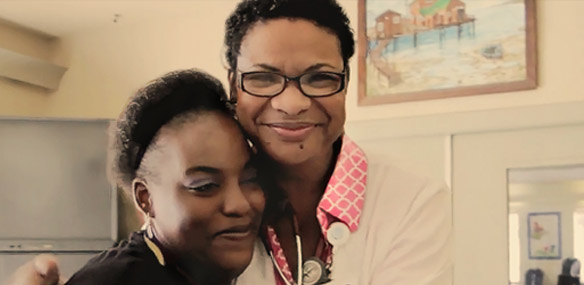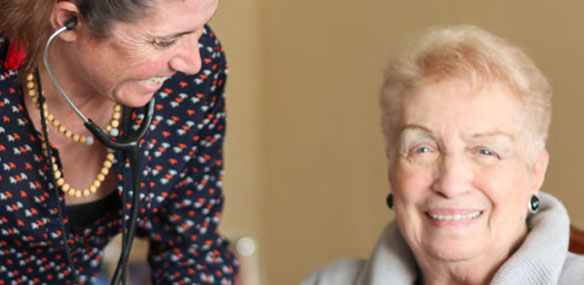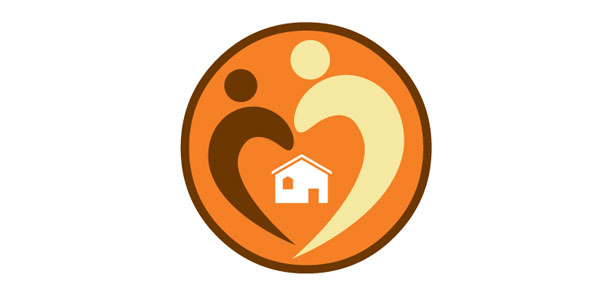Community Partnerships
Sutter’s mission extends beyond the walls of our care facilities. We put our mission into action by investing in community-based services, mobile clinics, transportation services, prevention and wellness programs and much more.

Bay Area
A community partnership with Mills-Peninsula Health Services, the Bay Area Community Health Advisory Council (formerly the African American Community Health Advisory Committee) raises awareness of the major health concerns and issues affecting African-Americans, and actively promotes a more healthful lifestyle. Learn more about the Bay Area Community Health Advisory Council.
A comprehensive, community-based child and adolescent healthcare center, the Bayview Child Health Center provides high-quality pediatric primary care and serves as a hub for access to community resources.
Sutter Health is a part of Health Action, a partnership of local leaders, organizations and individuals dedicated to improving health and well-being and reducing disparities across Sonoma County. Its in-depth report, A Portrait of Sonoma County, focuses on how county residents are faring in three fundamental areas: life expectancy, education and income. Based on the human development approach, it puts people at the center of an analysis to assess the opportunity each of us has to live up to our full potential. To that end, the report examines disparities within Sonoma County among neighborhoods and along the lines of race, ethnicity and gender, drawing connections between the multiple factors that influence health. It helps us identify specific places and populations in the county where we have the potential to positively affect health outcomes.
This consortium of more than 20 healthcare providers and educators throughout Sonoma County, including Sutter Santa Rosa Regional Hospital, encourages high school students of diverse backgrounds to pursue careers in healthcare. Through job shadowing, mentoring, financial aid and college application assistance and other services, the unique program works to develop a more culturally competent workforce.
A center for prevention and education, HealthFirst works to improve the health of uninsured and underinsured residents of San Francisco with chronic illnesses, such as asthma or diabetes. Offered through the Mission Bernal campus of California Pacific Medical Center, the HealthFirst team offers preventive care for high-risk patients by collaborating with these patients in the self-management of their chronic conditions. Learn more about HealthFirst.
Some patients face difficult end-of-life decisions as they are leaving the hospital.
Peninsula Circle of Care often refers those ready to stop medical intervention to Mission Hospice & Home Care. On an average day, Mission Hospice serves 240 people with hospice service and 85 patients in a palliative care program. The program also provides transitional care for 85 individuals who have a life-limiting illness but aren’t ready for palliative care or hospice.
Lisa Deal, chief clinical officer, Mission Hospice, realizes that many people think hospice is all about giving up and dying. “It’s more about how to orchestrate the living that you have left,” she says. “It’s a unique honor to be invited into someone’s home when they’re dying.”

Through our partnership with this community resource, we help ensure that more than 16,000 underserved San Franciscans receive access to personalized healthcare.
Across the greater Bay Area, multiple Sutter Health affiliates partner with Operation Access to donate outpatient surgical and specialty care for the uninsured and underserved in our communities.
“Coming home from the hospital can be overwhelming if you don’t have proper support,” Yvonne Chan, program manager, Peninsula Circle of Care, says. “Our program connects people to services they need to transition from hospital to home or other care settings.”
Peninsula Circle of Care, a partnership between MPMC and Peninsula Family Service, started with a grant from an anonymous donor to Mills-Peninsula Hospital Foundation. MPMC staff includes a team of nurses while Peninsula Family Service provides social workers and wellness coaches, who make home visits.
“We help people understand how to organize their medications,” Yvonne explains. “We make sure they feel comfortable sharing concerns and asking questions at their upcoming doctor appointments. If they need in-home caregivers, we help find them. We bridge the gaps in healthcare.”
Other available services and benefits include food, a medical alert system, home modifications such as handrails, and “pretty much anything that supports patient health,” Yvonne says.
In 2017, Peninsula Circle of Care served 672 patients, significantly lowering MPMC’s 30-day readmission rates. The hospital funds the program for patients who live in San Mateo County and need support at home. “A lot of older adults are stressed,” says Susan Houston, director, Older Adult Services, Peninsula Family Service. “Due to the high cost of living in this area they might not have enough money to live on or health insurance. Our wellness coaches and social work staff are experts in linking clients to free or low-cost resources in the county that they may not be aware of.”

Samaritan House improves access to primary and specialty care by providing screenings, radiology and labs to the uninsured and underinsured.
Samaritan House offers two free medical and dental clinics—in San Mateo and Redwood City—to about 2,500 uninsured or under-insured households throughout the county.
Bart Charlow, CEO, Samaritan House, says MPMC started playing a key role in supporting the nonprofit organization 25 years ago. “Doctors from Mills-Peninsula realized many of our clients weren’t getting proper medical care, so they set up a chair and hung up a couple of sheets for privacy and started volunteering their time to see patients in our original facility.”
Mills-Peninsula grants Samaritan House funds “to support our San Mateo Free Clinic and offers laboratory and radiology services for our patients,” Bart says. “Several Mills-Peninsula medical practitioners volunteer at our San Mateo clinic.”
MPMC also funds five medical respite beds at Samaritan House’s Safe Harbor Shelter for MPMC patients who don’t have a safe place to recover after release from the hospital. Safe Harbor Shelter is a 90-bed, 10-cot homeless shelter in South San Francisco.
To help needy families access primary medical care and to nurture the next generation of physicians in Sonoma County, Sutter Santa Rosa Regional Hospital supports the Santa Rosa Community Center's Residency Program. At Vista Clinic, family medicine doctors care for patients and receive outpatient training. More than half of all family medicine physicians practicing in Sonoma County have graduated from the residency program. Learn more about the Santa Rosa Community Health Center.
Valley Area
The Emergency Department Navigators are employees of WellSpace, a Federally Qualified Health Clinic. These individuals help interested patients find primary care physicians, "medical homes" and other services that provide the right care, in the right place, at the right time.
One of every six people in the United States goes hungry. To help fight hunger throughout Northern California Sutter Health routinely donates to local food banks. Learn more about our Food Bank donations.
Memorial Medical Center has provided monetary donations for the Stanislaus County Health Services Agency, a primary care safety net clinic, in support of its mental health program. The agency improves access to mental health resources and reduces emergency department visits and admissions.
In partnership with WellSpace Health, the Salvation Army, local healthcare systems and the County of Sacramento, Sutter Medical Center, Sacramento provides the Interim Care Program, a temporary respite program for homeless clients who are discharged from one of the participating hospitals. Learn more about the Interim Care Program.
Since 2008, Sutter Health has donated nearly 250,000 lbs of medical equipment and supplies to communities in need — locally and worldwide. A partnership with MedShare, our donations equal about 25, 40-foot ocean-going cargo containers.
In partnership with the City of Sacramento, Sacramento County, The Sacramento District Attorney’s Office, The Sacramento Police Department, Volunteers of America, The Downtown Sacramento Partnership and Sacramento Self Help Housing, Sutter Medical Center, Sacramento helps provide homeless people with chronic substance abuse problems with care, counseling and additional resources to better their lives.
The T3 (Triage, Transport and Treatment) program provides services to patients who seek emergency department care for needs that are best addressed through preventative measures and by primary care providers. Moving these patients from the emergency department improves the patients’ health by providing them with the appropriate care in the right setting while reducing the wait time in the emergency departments. Learn more about the T3 Program.
Sutter Tracy Hospital helped develop and funds the Tracy Family Practice for the uninsured to improve health and reduce financial burden of local residents, reduce readmissions and overall inpatient length of stay to reduce emergency department impact. The Tracy Family Practice works with the Sutter Tracy Hospital pharmacy doing case management of chronic diseases for those who are uninsured.
The Women’s Center – Youth & Family Services located in Tracy, and supported by Sutter Tracy Community Hospital and Tracy Hospital Foundation provides support, counseling and shelter services for women and children who have experienced domestic violence and sexual assault.









